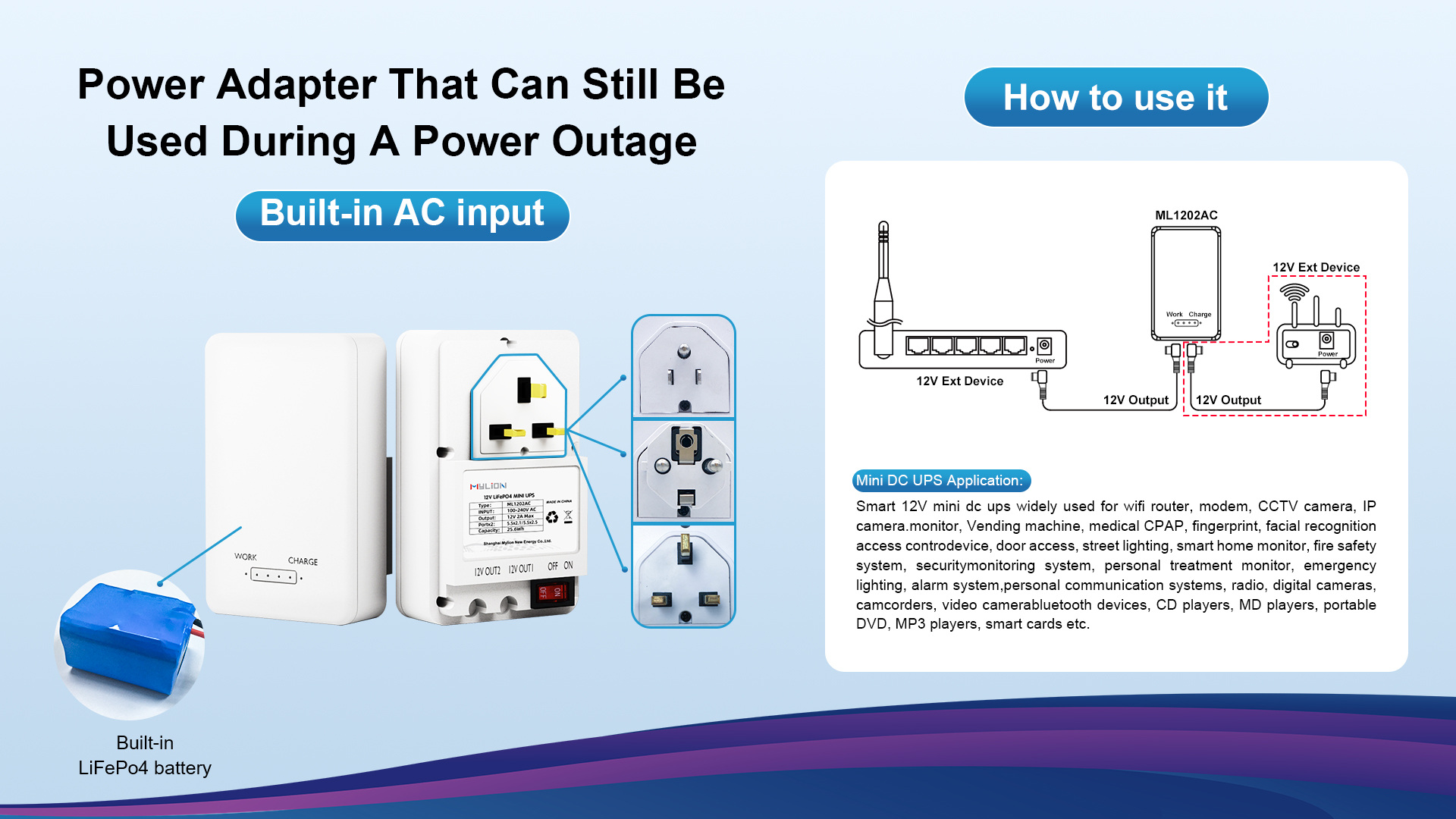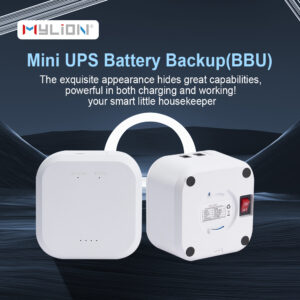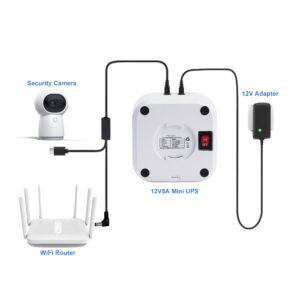As the world moves toward more sustainable energy solutions, backup power systems such as mini UPS devices are becoming increasingly important. In particular, mini UPS systems that use environmentally friendly lithium or lithium iron phosphate batteries provide green and efficient power solutions for a wide range of devices. These systems offer environmental and economic benefits with long battery life, high cycles, and low waste generation. This article explores how mini UPS units can help save energy, enhance sustainability, and help reduce the environmental impact of frequent battery replacement.

- The need for environmentally friendly power solutions
The growing demand for reliable backup power systems in homes, offices, and industrial environments has led to an increase in the use of uninterruptible power supplies (UPS). However, the environmental impact of traditional backup power systems, especially their battery technology, has raised concerns. Many traditional UPS systems use lead-acid batteries, which are not only bulky, inefficient, but also harmful to the environment. Lead-acid batteries have a limited lifespan, need to be replaced frequently, and pose a threat to the environment if not handled properly.
In contrast, mini UPS systems that use lithium or LiFePO4 (lithium iron phosphate) batteries offer a more environmentally friendly alternative. These batteries offer higher efficiency, longer lifecycles, and better energy density while minimizing environmental hazards. As mini UPS devices become more popular for powering critical home appliances, security systems, and office equipment, their environmentally friendly design plays a vital role in promoting sustainable energy practices.
- Lithium and LiFePO4 Batteries: The Green Revolution
The core of the environmental benefits of mini UPS systems lies in the use of advanced lithium-ion batteries, specifically LiFePO4 (lithium iron phosphate) battery chemistry. Unlike traditional lead-acid batteries, lithium-ion batteries are lightweight, compact, and highly efficient. They also have significantly higher energy density, which means they can store more power in a smaller space, providing longer backup time without taking up too much space.
LiFePO4 batteries are a type of lithium battery that stand out for their safety, longevity, and environmental benefits. These batteries are chemically stable, non-toxic, and contain no heavy metals, making them a safer choice for both users and the environment. The main environmental benefits of mini UPS systems using these advanced batteries include:
Less environmental impact: LiFePO4 batteries are non-toxic and do not contain hazardous materials such as cadmium, lead, and mercury commonly found in traditional batteries.
Recyclability: Lithium batteries, including LiFePO4 batteries, are recyclable, reducing the amount of hazardous waste that goes to landfills.
No emissions: Unlike traditional lead-acid batteries, LiFePO4 batteries do not emit harmful gases or chemicals during operation or disposal.

- Long Life and High Cycle Count: Reduced Waste and Lower Carbon Footprint
One of the most notable advantages of a Mini UPS system with lithium or LiFePO4 batteries is its long life and high cycle count. A single Mini UPS equipped with these batteries can provide thousands of charge and discharge cycles, often exceeding 2000 cycles, which is far greater than the typical life of a traditional lead-acid battery. Lead-acid batteries typically have a service life of about 500 to 800 cycles, a shorter lifespan, require frequent replacement, generate more waste, and cause environmental harm.
In contrast, the high cycle count of Mini UPS systems with lithium or lithium iron phosphate batteries means they can be used for longer before they need to be replaced. This results in:
Reduced Waste: Fewer batteries need to be disposed of, resulting in less environmental pollution and waste. Because lithium and LiFePO4 batteries have a longer lifespan, the need for frequent battery replacement can be minimized, resulting in a more sustainable energy solution.
Reduced Carbon Footprint: The manufacture and disposal of batteries, especially lead-acid batteries, can seriously pollute the environment. By reducing the frequency of battery replacement, Mini UPS systems help reduce the overall carbon footprint associated with backup power solutions.
This long life and high cycle count make mini UPS systems a more sustainable choice, especially in areas with frequent power outages where backup power systems are often heavily used and require regular maintenance.
- Efficient Power Management to Save Energy
In addition to eco-friendly battery technology, Mini UPS systems are designed to be energy efficient. These systems use intelligent power management features to ensure that energy consumption is minimized during normal operation and when charging the backup battery. Key energy-saving features of Mini UPS include:
Automatic power switching: Most Mini UPS systems automatically switch to battery power when the grid loses power, and then revert to grid power when power is restored. This automatic feature prevents the system from consuming unnecessary power when it is not needed.
Power saving mode: Many Mini UPS systems come with low-power or energy saving modes that reduce power consumption of devices connected to the UPS during off-peak hours, contributing to overall energy savings.
These energy-saving features ensure that the Mini UPS system does not waste power during both the usage and charging cycles, making it a more environmentally friendly and cost-effective solution.

- Economic Benefits of Mini UPS with Lithium Iron Phosphate Batteries
The economic benefits of using a Mini UPS system with long-life lithium or LiFePO4 batteries extend beyond environmental advantages. While the upfront cost of a Mini UPS may be slightly higher than a traditional model, the long-term savings and efficiencies outweigh the initial investment. Key economic benefits include:
Reduced Maintenance Costs: The durability and long life of a Mini UPS system with lithium batteries means fewer replacements are required, reducing overall maintenance costs for home and business users.
Lower Total Cost of Ownership: Over time, longer life and fewer replacements mean a lower total cost of ownership for Mini UPS users. Users can enjoy a reliable backup power system without having to spend money on frequent battery replacement or repairs.
Reduced Environmental Fees: Some areas impose disposal fees for hazardous materials such as lead-acid batteries. By switching to a Mini UPS system with LiFePO4 or lithium-ion batteries, users can avoid these fees because these batteries are more environmentally friendly and recyclable.
Thus, a Mini UPS system with lithium or LiFePO4 batteries represents a win-win situation, saving money while achieving environmental sustainability.
- Sustainability in the Big Picture
The widespread adoption of mini UPS systems powered by lithium or LiFePO4 batteries fits in with the global trend toward more sustainable energy solutions. These devices are critical to reducing the environmental impact of power outages, especially in areas where power outages are common or where backup power is critical to keeping homes, businesses, and essential services running.
For example, in developing countries where power supplies may be unreliable, mini UPS systems help ensure that users are not without power for long periods of time. By providing a reliable, long-lasting, and environmentally friendly backup power option, mini UPS systems reduce the need for fossil fuel generators, which contribute significantly to pollution and carbon emissions.
In addition, the shift toward using mini UPS systems with advanced lithium battery technology supports a broader transition to greener technologies in power management and energy storage, paving the way for more efficient, more environmentally friendly solutions.
Conclusion
As global energy demand continues to grow, the need for reliable, efficient and environmentally friendly backup power systems becomes increasingly important. Mini UPS systems powered by lithium-ion or LiFePO4 batteries offer a sustainable, green solution to this challenge. With long life, high cycle counts and low environmental impact, these systems not only help users maintain uninterrupted power, but also contribute to a cleaner, more sustainable environment.
By minimizing waste, reducing carbon footprints and providing energy-efficient power management, mini UPS systems with advanced battery technology are helping consumers and businesses create a more sustainable future. As more people recognize the environmental and economic benefits of these systems, the adoption of mini UPS devices is likely to increase, further accelerating the transition to cleaner, greener energy solutions.





